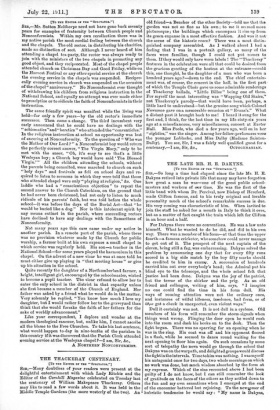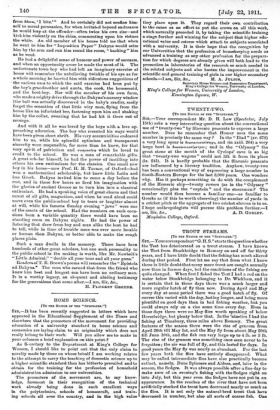THE LATE MR. H. E. DAKYNS.
[To THE EDITOR Or TRX "SPECTATOR."' SIR,—So long a time had elapsed since the late Mr. H. E. Dakyns retired into private life that many may have forgotten how great a man he was—one of the great public school- masters and workers of our time. He was the first of the little band with whom Dr. Percival, now Bishop of Hereford, made Clifton famous, and to his truly original and lovable personality much of the school's remarkable success is due. His very coming was characteristic of him. When invited to join the staff he asked for a month in Italy to think it over, but as a matter of fact caught the train which left for Clifton in an hour and a half.
For Dakyns there were no conventions. He was a law unto himself. What he wanted to do he did, and did in his own way. There was a member of his form—at that time the upper fourth—a famous cricketer, who somehow could never manage to get out of it. The prospect of the next captain of the eleven, being still a fag, was embarrassing. Dakyns solved the problem by announcing one day that for every fifty runs scored in a big side match by the boy fifty marks should be credited to him in examv. A succession of hundreds carried him out over everybody's head; the Admiral put his blind eye to the telescope, and the whole school felt that justice had been done. Dakyns was the joy of the patriot, but the terror of the shirker and the prig. As an old friend and colleague, writing of him, says, "I imagine no one could find the time in his form dull. His ways of rousing attention were not the ordinary ones, and instances of wilful idleness, insolence, bad form, or of 0/3pir got a check in unexpected, even violent ways."
Dull it certainly was not. It is not dull in a cyclone. Old members of his form will remember the storm-signals when things went wrong. Flinging the door open he would rush into the room and dash his books on to the desk. Then the fight began. There was no sparring for an opening when he was in the ring. His coat was off and his opponent floored in a flash, while he seemed to dance round waiting for the next opening to floor him again. On such occasions by some sort of telepathy the news would go through the school that Dakyns was on the warpath, and delighted groups would discuss the fight in the intervals. Time to him was nothing. I was myself his antagonist once for two days, two whole mornings on which no work was done, but much wisdom absorbed by the form at my expense. Which of the Bins recounted above I had been guilty of I do not know, but I can still remember the look of gratitude on the faces of the others as they settled down to the fun and my own sensations when I emerged at the end of the encounter battered but rejoicing. To the newwmer of hubristic tendencies be would Bay: "My name is Dakyns.
from adeve, ' I bite." And he certainly did not confine him- self to moral persuasion, for when irritated beyond endurance he would leap at the offender—often twice his own size—and kick him violently on the shins, commenting upon his virtues the while. An old member of his house told me that when he went to him for "Imposition Paper" Dakyns would seize him by the arm and run him round the room, "hacking" him as be went.
He had a delightful sense of humour and power of sarcasm, and when an opportunity arose he made the most of it. The unfortunate town boy who had left an imaginary exercise at home will remember the unbelieving twinkle of his eye as for a whole morning he harried him with ridiculous suggestions of
• the various uses to which the said exercise had been put by the boy's grandmother and aunts, the cook, the housemaid, and the boot-boy. Nor will the member of his own form, who made a mighty drive through the Dakyns's nursery window (the ball was actually discovered in the baby's cradle), easily forget the sensation of that little wiry man, flying from the house like an infuriated bee, fastening upon him and shaking him by the collar, swearing that he had hit it there out of revenge.
And with it all he was loved by the boys with a love ap- proaching adoration. The boy who resented his ways would have been given short shrift. His very eccentricities endeared him to us, while his splendid optimism and transparent sincerity were responsible, far more than he knew, for that very spirit of patriotism and eeepoo-lant which he loved to credit to the school. He was a man of remarkable gifts. A great scholar himself, he had the power of instilling into others his own enthusiasm for the classics. One small new boy in his house—now Prof. H. H. Turner, of Oxford—had won a mathematical scholarship, but knew little Latin and less Greek. Dakyns invited him to come a day before the rest, and in those few hours so fired his imagination with the glories of ancient Greece as to turn him into a classical enthusiast. He bad a speaking voice of great charm and that rarest of all gifts, magnetism, and when he read aloud could move even the public-school boy to tears or laughter almost at will, while his famous Sunday evening "jaws" were one of the assets of the school. Had the numbers on such occa- sions been a variable quantity there would have been no standing room on Dakyns nights. He had the power of listening that drew from boy and man alike the best he had to tell, while in time of trouble none was ever more lovable or human than Dakyns, or better able to make the rough places plain.
Such a man dwells in the memory. There have been hundreds of other great scholars, but one such personality to the public school in the making is worth, like Mr. Newbolt's "Little Admiral," "double all your tons and all your guns."
Readers of T. E. Brown's poems will remember the" Epistola. ad Dakyna." The man who earned that from the friend who knew him best and longest can have been no ordinary man. It is a worthy legacy, an eloquent and abiding testimony for the generations that come after.—I am, Sir, &e., H. PLUNKET GREENE.







































 Previous page
Previous page